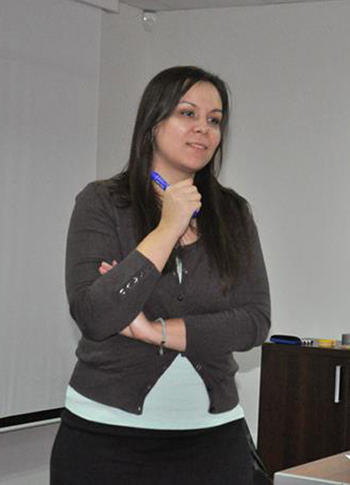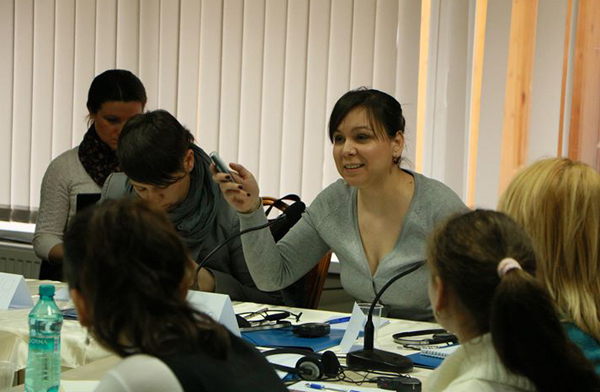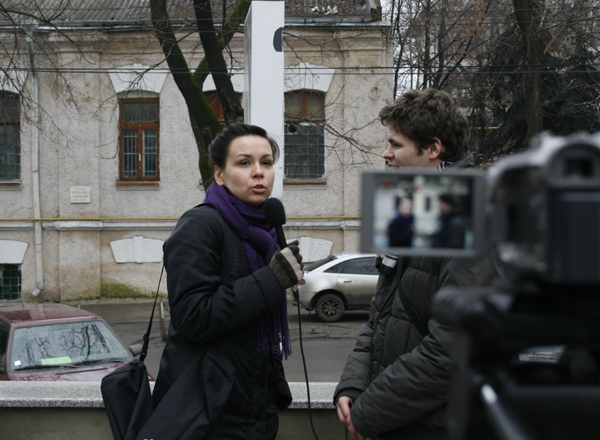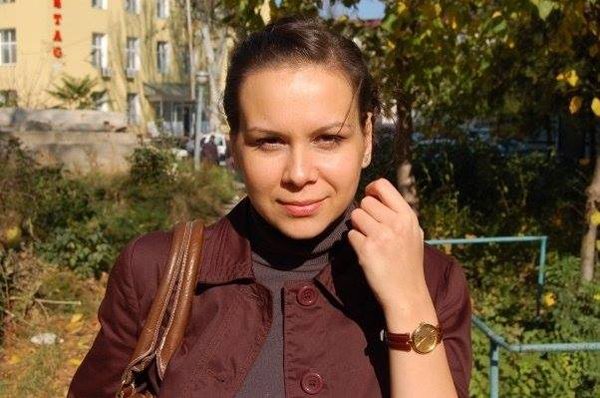”At the CSAJ I learnt how to do proper journalism, so that nobody ever could blame me for being unfair”
She is in love with radio. She graduated in journalism and already during her studies she began practicing this craft at the investigation weekly Ziarul de Garda. In 2010 she was awarded the “Apple” as the best radio journalist. Lately she became a radio journalism trainer, teaching those who want to learn this profession. We refer to Diana Răilean, Radio Free Europe/Radio Liberty (RFE/RL) reporter and graduate of the Chisinau School of Advanced Journalism (CSAJ).
 Question: I think each student has a story about the way he got to the CSAJ, what is your story?
Question: I think each student has a story about the way he got to the CSAJ, what is your story?
Answer: I heard the ad about the CSAJ on the radio already during the first study year. I realized that I had to graduate the university first, before I could join this School. Every year, as I studied journalism at university, I was counting down: 2 more years to wait, 1 more year… a little bit more and I will have the chance to join CSAJ. And then what happened? I submitted the application and went to the interview. Oh Lord, I recall the interview, there were the best journalists: Vasile Botnaru, Alina Radu, Liliana Viţu. This was a real test for me. At that time, I had a tic, saying at every step “na” (so). I remember clearly when Vasile Botnaru asked me: “na” comes from the Romanian word “na” or from the Russian “na”?...That was a beautiful experience. That is how I got to the CSAJ.
Question: You practiced journalism before joining the CSAJ (while studying and later working at Ziarul de Gardă), in fact, you were an already trained journalist, if I may say so. From this perspective, why did you need more journalism at the CSAJ?
Answer: I went to Ziarul de Gardă and had the luck to work there, as I believed that a journalist can polish up only in print press. Since then I realized that there is much more to learn. That kind of acknowledgement may be compared to drinking tea every day, however the tea is of various kinds (with bergamot or jasmine flavor, peppermint and so on), you should try as many different types of tea as possible, in order to understand which one suits you best. At the CSAJ I was offered the chance to try everything – radio, TV, print press, online and understand what fits me best. Further speaking metaphorically, the ones who offered me the tea were the best journalists in the Republic of Moldova. There I had the opportunity to learn the craft from the best professionals. I don’t say that this was different at the journalism faculty, but at the CSAJ you learn during a year as much as others learn during ten years, just like in the fairy tale “Făt Frumos din Lacrimă”...
Question: In what way the knowledge and skills gained at the CSAJ help you today?
Answer: Good family upbringing is very important for shaping the personality. In journalism, Ziarul de Gardă and the CSAJ provided that kind of proper upbringing. To me, the CSAJ laid the foundation in journalism. Each of us, when writing, reporting get in situations when has to ask questions: An MP invites me in the field, should I go or not? I interview a child, should I talk to his parents or not? I talk to a child who was abused, should I show his face or not? Questions always pop up. When you don’t have the basics, or you were not told “not to do so” or “to do so”, you can make mistakes that sometimes are impossible to repair. At the CSAJ I learnt how to do proper journalism, so that nobody ever could blame me for being unfair.
Question: If you could describe the CSAJ in one word, which one would it be?
Answer: Elevator…
Question: …and journalism?
Answer: Penthouse… why? Because you see everything from there.
Question: Did you ever have remorse that the CSAJ “stole” almost one year of your life?
Answer: If it could “steal” one more year, I would be at the peak of happiness. I believe that without the CSAJ I wouldn’t have got to RFE/RL. At the CSAJ I learned how to edit a radio report, to make transcripts, to talk to people, which is a very important thing for a journalist. No, I have never thought that the CSAJ stole a year of my life. I was very lucky to join the CSAJ.
Question: You started with print press, later you changed to radio. What is the difference between two of those?
Answer: Regardless of the press genre, you work for people. Radio is different, here I refer to RFE/RL, maybe things work differently in other media outlets. Radio reports are shorter and there are daily deadlines, whereas at the newspaper (now I refer to Ziarul de Gardă weekly) you have more time to think over your article and the final product is much more detailed. From the technical point of view these two press genres differ. I think that radio fits me best, because there is only me, the voice recorder and the person. It may thunder, lighten, anything… I am the master of my story.
Question: By the way, what does it mean to you to be a journalist, a good journalist?
Answer: I think that good journalists are the trainers who taught us at the CSAJ and the editors I worked with. A good journalist should do his job with dedication, every single day. He must be curious, work hard, be accurate and not take sides.
Question: Recently we admired you in a new position, that of a trainer. How does it feel and what can you tell us about this challenge?
Answer: There were several young people I told about radio journalism. It was nice to share my experience, which, in turn, I gained or “took over” from others. The meeting was planned to last two hours, however when the participants don’t let you go and ask you to keep on telling interesting things, you realize that Vasile Botnaru, Alina Radu, Alexandru Canţîr, Vlad Bercu haven’t wasted their time at the CSAJ and in the newsrooms. I recall one Sunday when Vasile Botnaru chose to go with me to the office, kept me for one hour in the studio and taught how to read properly. As well Alina Radu and Aneta Grosu taught me to write. People invested in me, I took it as a credit, which I pay back now to the young journalists and altogether to the general public.
 Question: Could you please make a ranking of 3 biggest challenges for a journalist?
Question: Could you please make a ranking of 3 biggest challenges for a journalist?
Answer: First of all, fairness. As we in the middle of the event that occur in Kiev, it hurts me to see media outlets making political partisanship, they simply lie. Honestly speaking, I don’t know if that is a challenge, it is rather a sin. Be fair. I wouldn’t be able to lie and afterwards sleep peacefully. The second challenge is to maintain the distance between yourself and sources and the politicians, as they often try to manipulate journalists, to approach them, to corrupt them. Thus it is very important to know where the boarder between them and us – journalists is. And the third one is uprightness. To do your job properly, so that no one ever could able reproach you anything.
Question: And a final question, what are your advices to current students and young journalists of the CSAJ?
Answer: Let them not envisage themselves only as TV or radio presenters, because good moderators are backed by very good reporters. Here are a few examples: Oxana Iuteş, a very good reporter and presenter, Angela Gonţa or Liliana Barbăroşie, very good presenters, who used to work and continue working a lot in the field. All professional journalists are people who work very hard. Let them not see themselves as headliners, but rather take the voice recorder, look up for topics and sources, interview people and work hard. And, in the end, they will become more experienced and gain everybody’s credibility.
photo sourse(s): CTJM, CSAJ, personal archive.

